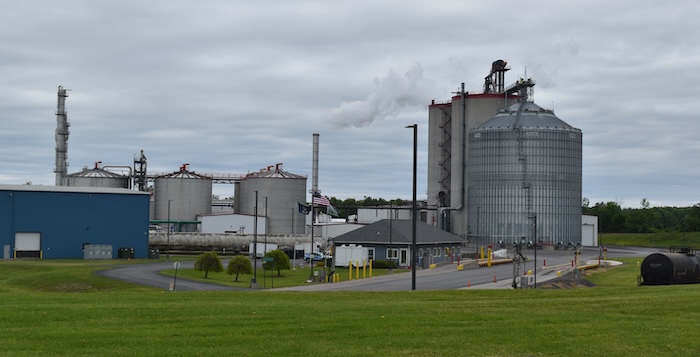Trump Administration cancels $15 million grant for decarbonization project in Medina
Skyven Technologies planned first-of-its-kind system at Western New York Energy

Photo by Tom Rivers: Western New York Energy has operated an ethanol plant at the corner of Bates Road and Maple Ridge Road in Medina since 2007. This photo was taken on Sunday.
MEDINA – A federal grant for $15 million would have helped build the first-of-its-kind industrial decarbonization system at Western New York Energy.
But that project, and 23 other clean energy and manufacturing innovation projects across the country, were cancelled last week by the Trump Administration.
Skyven Technologies was looking to build the industrial decarbonization system at the ethanol plant. The company said the nationally significant project uses electrified high-temperature steam production, calling it a critical need for decarbonizing U.S. manufacturing.
Skyven said its system would have reduced annual operating costs at the ethanol plant, cut carbon local emissions, and served as a replicable model for food, beverage and chemical manufacturers across the country.
“This groundbreaking project is a major step forward in reducing carbon emissions in the industrial space,” Skyven, a Texas-based company, announced in September. “Arcturus will cut 20,000 metric tons of CO2 emissions per year from WNYE’s facility, which is equivalent to removing 4,300 cars from the road annually. And this is just the beginning of what our cutting-edge technology can achieve.”
The project had already attracted major private investment and was expected to drive an additional $150 million to the Medina site, the company said. Skyven in September announced it had been approved for a federal grant for the project.
Energy Secretary Chris Wright on Friday announced that $3.7 billion in project grants were being cancelled by the Department of Energy.
After a thorough and individualized financial review of each award, the DOW found the projects “failed to advance the energy needs of the American people, were not economically viable and would not generate a positive return on investment of taxpayer dollars,” according to a press release from the DOE.
The grants were primarily targeted for carbon capture and sequestration, and decarbonization initiatives.
“While the previous administration failed to conduct a thorough financial review before signing away billions of taxpayer dollars, the Trump administration is doing our due diligence to ensure we are utilizing taxpayer dollars to strengthen our national security, bolster affordable, reliable energy sources and advance projects that generate the highest possible return on investment,” Wright said in a statement. “Today, we are acting in the best interest of the American people by cancelling these 24 awards.”


























































